As an Amazon Associate I earn from qualifying purchases.
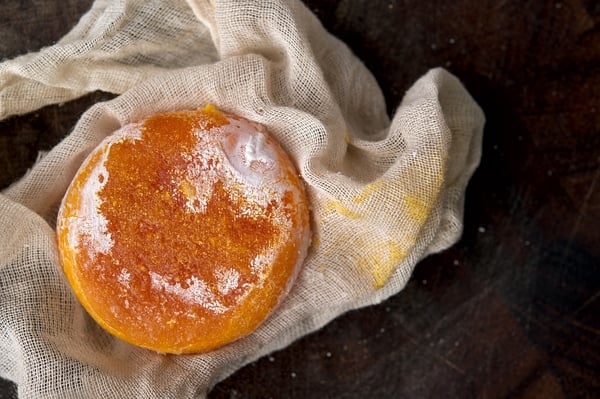
Egg yolks are one of the most magical of foods. Chefs all over the world wax poetic about them, but it’s hard to understand why when all you might be exposed to are the wan, watery, factory-farmed yolks you see in most supermarkets. A golden treasure they are not.
You can only understand the joy — lust, even — over an egg when you finally see (and taste) a real egg, eggs from chickens raised on grass and bugs and whatever else it is that a hen loves to nibble throughout the day.
Before I’d encountered such eggs, when I saw pictures of Italian egg pasta, I thought they were retouched: Their pasta is always bright yellow. As much as I tried, I found it impossible to duplicate with eggs from the supermarket. I talked to Italian pasta makers and they said you need yolks of a truly golden, almost orange, hue. That’s what gives you that pretty color.
I came into possession of such eggs from my friend Teala’s father, who raises ducks and geese in my neighborhood. It’s what I prefer to use for my pasta, and, just like the Italian pasta pictures I swooned over, the photos on this post are not retouched. This is precisely how yellow they actually are.
Not too long ago, Teala’s dad gave me two goose eggs along with the duck eggs. I was amazed at their size. I cracked one open and made an entire batch of pasta with that one egg. I was shocked at how orange the yolk was — brighter even than the duck eggs.
I wanted to capture that color, that richness. I’d known about salt cured egg yolk for a few years; my friends, Chefs Brad Cecchi and Oliver Ridgeway at Grange in downtown Sacramento had first clued me into it. Basically you bury egg yolks in salt, then dry them out until they are like a very hard cheese. This is exactly how you use them — as a golden, eggy, über rich substitute for grated cheese over pasta or rice.
Brad and Oliver never explained to me exactly how to do this, but fortunately Chef Jeffrey Weiss does in his remarkable book Charcutería: The Soul of Spain. You will be seeing a lot of this book in the months to come. I am mildly obsessed with it and have already made a half-dozen or so of its recipes, ranging from salami to sausages to cured fish and now, here, salt cured egg yolks.
If you’ve never cured anything in your life, this would be a good place to start. It’s really easy and comes together in about 2 weeks. And once you’ve made the cured yolks, you can use them over pasta for months.
What else can you do with cured egg yolk? Not sure. I eat a lot of pasta. What would you suggest?
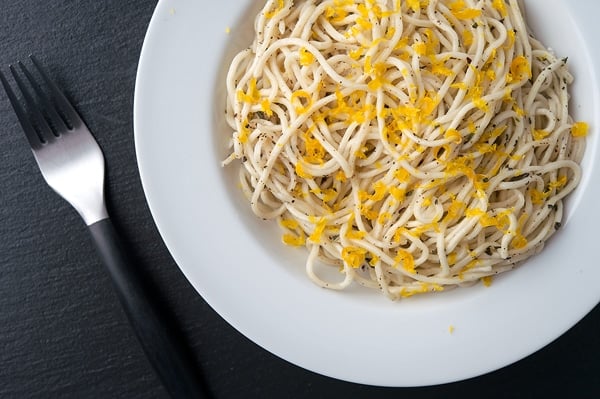
Grate your egg yolks over any of these pasta recipes.
Salt Cured Egg Yolk
Ingredients
- Egg yolks
- Salt
- Cheesecloth
Instructions
- Get yourself two containers: One for the whites, so you can do something with them later, and one to cure the yolks. You will need to lay down a half-inch layer of kosher salt in the bottom of your curing container; you can go a little deeper if you want. Make little depressions in the salt to hold the egg yolks.
- Crack the eggs and separate them. Gently lay the yolk in one of the depressions and repeat until you have all your eggs in the container. Now bury them in more salt.
- Keep the yolks buried in the salt for a week in the refrigerator. Take them out -- the yolks will be firm and a little tacky still -- and carefully brush off the salt. You might need to remove the salt with a damp paper towel.
- Wrap the yolks loosely in cheesecloth and hang them in the fridge until they are dry, about 7 to 14 days. Store in the cheesecloth in a closed container in the fridge.
Notes
Nutrition information is automatically calculated, so should only be used as an approximation.
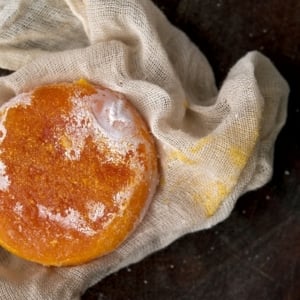
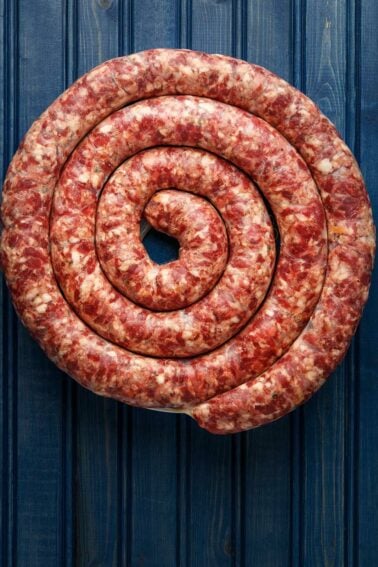
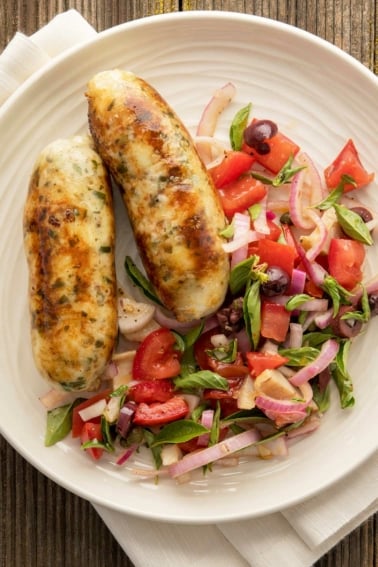
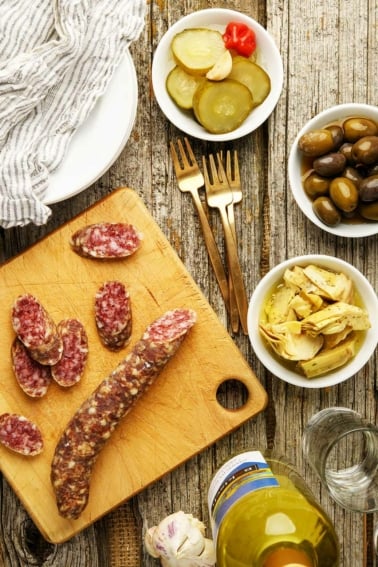
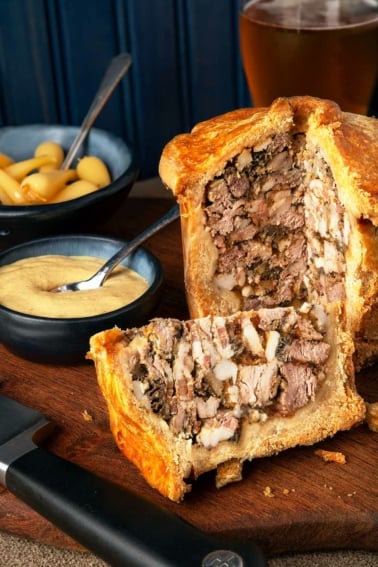
Thanks, this is great! Most other recipes seem to call for sugar but that seemed unnecessary to me, and sure enough, here we are without. Just picked up some duck eggs from a nearby farm and will get this started before the busyness of the weekend!
Do the yolks need to be hung individually wrapped in the cheesecloth or can a bunch of them be all wrapped up together, touching each other in the same bundle?
Tim: They need to be separate.
I can’t wait to try this! I will use the leftover salt for salting my walk. That’s all I use anyway.
I am one week into the initial cure and my yokes are not firm. I noted the salt was wettish which was good, but then I though maybe I should have left the container uncovered to let the removed moisture escape. Should the curing container be covered or uncovered?
It sounds very interesting! A question I had was could you combine more than one yolk together into the salt and then into the cheesecloth? Or do they have to be separate? Also, should it be in one layer of cheesecloth or several?
Scott: One yolk. If you break them they won’t hold shape. Several layers of cloth.
So neat! Any use for the salt after that? Would hate to waste it…
Ashley: I toss it or use it for more eggs.
Salted eggs have strong roots in Cantonese cuisine, and in recent years they’ve found their way into pastry – mixed up into a custard and put in buns or croissants!
I also finish mine in the smoker. So tasty!
I slice mine very thin and eat with cheese, meat, and crackers. Delicious!
If you freeze your eggs , and partially defrost them, get rid of the white, leave the yoke semi froze, make it much easier to handle.
Thank you! Good to know the salt is a feature, not a bug.
Hey! I tried this about a year ago with some chicken eggs (good ones though- my neighbor raises them!) and it didn’t totally work out for me. I had a really hard time getting the salt off when the yolks were still at the tacky stage, and then once they’d dried it was impossible (duh) and too salty. Also, I wasn’t totally sure when I should declare them dry.
Anyways, I now have ducks (!) that are going to start laying in the fall, and I was thinking about trying this again. Any thoughts?
PS: “I dunno, this is kinda foolproof?” would be a perfectly charitable answer. I have a tendency to struggle with things that are supposed to be dead-simple :D.
Becca: You only brush off most of the salt, not all. And they are supposed to be super salty — they’re a condiment, shaved onto things, after all. If the yolks are still too tacky when you check them, keep them buries another day. And you declare them dry when you can pick one up and shave it. It will continue to dry as time goes on.
Hi. Do you know if these could be vacuum
Sealed to make shelf stable?
Sarah: They are pretty stable as-is. I’ve kept them in a plastic container in the fridge for more than a year.
I just put my first batch of these in the fridge and am very excited to see how they turn out. What do you do with all your left over salt, cure more yolks?
How long could a cured yolk keep at room temperature or above? Interested to take one on a 6 day backpacking trip to liven up backcountry meals. Thanks!
Andrew: Once it’s done, you’ll be fine. These things are so salty not much can hurt them.
I love to shave these over a salad or into soup. Delicious!
What happens if I accidentally left it out the first day? It was a fresh duck egg that was already sitting on the counter since they weren’t washed. I think it’s okay, but do you think the curing time will be shorter since it was at room temp?
Yecca: You should be fine.
Could the yolk be cold smoked between the cure and dry?
D.Davis: No. Too gooey. But it could be smoked maybe 3/4 of the way through drying. Good idea!
I love watching people’s faces when they rave about how delicious my “jumbo” eggs are and I point out they come from my ducks. Course, my pan fried venison cube steaks raise a few eyebrows too. Thx for the salted yolk recipe.will try this week
I have made the salt cured egg yolks several times now! The process of removing the yolk from the salt is like opening Christmas presents to me! Fantastic and wonderful step by step! Thanks Hank!